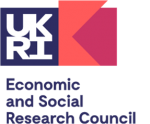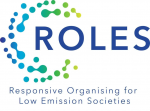Active projects
Household and Community Labour in Smart Local Energy Systems project
 Smart energy technologies are an increasingly big part of modern life, but how do we ensure they work fairly for everyone? This UKRI ESRC-funded project, a partnership between the University of Sussex, the Centre for Sustainable Energy and King’s College London, examines how households contribute vital, but often overlooked, work to make smart local energy systems successful. This includes learning to work with new energy technologies such as smart energy meters and apps; adapting daily life in ways that reward demand flexibility; and seeking and providing support with technologies.
Smart energy technologies are an increasingly big part of modern life, but how do we ensure they work fairly for everyone? This UKRI ESRC-funded project, a partnership between the University of Sussex, the Centre for Sustainable Energy and King’s College London, examines how households contribute vital, but often overlooked, work to make smart local energy systems successful. This includes learning to work with new energy technologies such as smart energy meters and apps; adapting daily life in ways that reward demand flexibility; and seeking and providing support with technologies.
The researchers will collaborate with community energy organisations and households across the UK to understand how this 'hidden' work is distributed and valued. Through workshops, case studies and policy engagement, the project will develop practical tools for community groups and evidence-based recommendations for policymakers to ensure smart energy systems work fairly for everyone involved.
For updates and further information, please see the Centre for Sustainable Energy’s website, LinkedIn and Bluesky pages.
Research themes: Energy and society; Energy innovation and digitalisation; Just and sustainable transitions to net zero; Energy governance and policy
Principal Investigator (PI): Prof Adrian Smith
This research is funded by UKRI ESRC. Grant number: ES/Z503757/1
Advancing Capacity for Climate and Environment Social Science (ACCESS)
 ACCESS is a five year climate and environment social science project funded by the Economic and Social Research Council (ESRC). It aims to provide leadership on the social science contribution to tackling and solving a range of environmental problems. ACCESS will provide insights to find fresh thinking and new solutions to support the transition to a sustainable and biodiverse environment and a net zero society.
ACCESS is a five year climate and environment social science project funded by the Economic and Social Research Council (ESRC). It aims to provide leadership on the social science contribution to tackling and solving a range of environmental problems. ACCESS will provide insights to find fresh thinking and new solutions to support the transition to a sustainable and biodiverse environment and a net zero society.
ACCESS consists of four work packages underpinned by three crosscutting themes of ‘Knowledge Co-Production’, ‘Equality, Diversity & Inclusion’, and ‘Net Zero Sustainability’:
- WP1. Map, Assess and Learn from the past experiences of social scientists to catalyse change in policy culture, institutions (e.g., civil service), businesses and civil society.
- WP2. Empower environmental social scientists at different learning and career stages by providing tailored training and capacity building.
- WP3. Innovate by creating new ideas and testing new approaches that enable social scientists to play influential, leading roles in addressing environmental challenges.
- WP4. Champion & coordinate environmental social scientists across the UK and internationally by providing an accessible knowledge/data hub and innovative public engagement tracker.
Research themes: Energy and society, Just and sustainable transitions to net zero, energy governance and policy
Principle Investigator (PI): Professor Benjamin Sovacool
Energy Demand Research Centre (EDRC)
The UK has a legal duty to become a Net Zero society by 2050, requiring a change in the way energy is used across different sectors of industry, businesses, transport and buildings. Without a significant reduction in energy demand, the UK is unlikely to meet these ambitions.
Many UK homes and businesses have also faced high energy prices in the last year, bringing greater public attention to issues such as energy affordability and security.
These challenges provide an opportunity for energy demand reduction to bring benefits via improved energy efficiency and broader societal changes to reduce emissions, secure prosperity, reduce inequality and improve quality of life.
As the UKRI’s flagship £15 million investment in energy demand research, the Energy Demand Research Centre has a key role in providing evidence on actionable solutions for energy demand reduction across different sectors. The Centre is interdisciplinary, covering expertise in technological, social, economic, business and policy aspects.
Our overarching vision for the Centre is to inform and inspire energy demand reductions that support an affordable, comfortable and secure Net Zero society.
Research themes: Energy and Society, Just and sustainable transitions, energy innovation and digitalisation, energy governance and policy
Principle Investigator (PI): Professor Mari Matiskainen
Governing sustainable energy-mobility transitions: multi-level policy mixes, transformative capacities and low-carbon innovations (EMPOCI)
 EMPOCI is investigating how the global transition to low carbon energy and mobility systems can be accelerated on a regional and national level. The project aims to provide a comprehensive assessment of the governance of such interconnected and politically contested multi-sectoral deep transition processes - with a dedicated focus on broad policy mix thinking.
EMPOCI is investigating how the global transition to low carbon energy and mobility systems can be accelerated on a regional and national level. The project aims to provide a comprehensive assessment of the governance of such interconnected and politically contested multi-sectoral deep transition processes - with a dedicated focus on broad policy mix thinking.
The project is developing an interdisciplinary framework which foregrounds the causal interplay between actors, policy mixes and low-carbon innovations in energy-mobility transitions. The framework bridges innovation/transition studies and policy studies to better capture the political and co-evolutionary nature of sustainability transitions, paying greater attention to the role of coalitions, policy feedbacks and contexts.
Researchers will analyse the innovation-led decarbonisation of the increasingly interconnected electricity-mobility-ICT systems in two European countries (UK, Germany), and two countries outside of Europe (China, USA).
Research themes: Just and sustainable transitions, energy innovation and digitalisation, energy governance and policy
Principle Investigator (PI): Professor Karoline Rogge
Going Dutch?
Decarbonising heat remains a key energy policy and technology challenge in the UK and indeed globally. Residential heat forms the largest single source of emissions from heat demand in the UK. The challenge of decarbonising residential heat is also dominated by a high dependence on natural gas; in 2017, the share of gas in residential space heating demand was 75%. The Netherlands is the only other country in Europe with an even greater dependence on natural gas for heating. The UK and NL are therefore both embarking on a transition away from natural gas from a similar starting point. They both have a strong climate policy framework and there are common expectations in both countries that lower heat demand, more district heat networks and a higher proportion of heat from renewable sources will form elements of the solution.
However, following earthquakes in the Gröningen region linked to gas extraction in January 2018, the Dutch government moved decisively to ‘get rid of gas’ (van loos gas) by 2030, including for residential heating. This has provided major momentum to heat decarbonisation policy in NL, which is currently moving ahead more quickly than that in the UK. The pace of change in the Netherlands offers an opportunity for the UK to learn from Dutch successes and challenges. This includes current decisions about networks, technologies and energy vectors, and governance frameworks.
Research themes: Energy Innovation & Transitions
Green New Deal for Housing
This project represents a bold plan to address the high energy bills associated with the ongoing cost of living crisis in the UK, while reducing our domestic CO2 emissions
It is proposing a 10 year policy plan with a package of measures, including a £60bn investment in insulating low income households, new local delivery models, and a rollout of heat pumps and rooftop solar to millions of UK homes over the coming decade creating 100,000s of new green jobs.
Research themes: Energy and Society, Just and sustainable transitions, energy governance and policy
Principle Investigator (PI): Dr Donal Brown
LAND use based MitigAtion for Resilient Climate pathways (LANDMARC)
 LANDMARC explores the potential for mitigating climate change by changing how we use land, so more carbon is captured and stored in the soil or in biomass (like trees). It does this by applying a unique mixed-methods approach that includes:
LANDMARC explores the potential for mitigating climate change by changing how we use land, so more carbon is captured and stored in the soil or in biomass (like trees). It does this by applying a unique mixed-methods approach that includes:
- A combination of remote sensing (satellite-based) and in-situ monitoring tools
- A set of models combining climate, land use, carbon cycle, ecosystem, and socio-economic systems
- Iterative and continuous stakeholder engagement to better understand LMT management practices and barriers to scaling
- A comprehensive assessment of quantifiable and non-quantifiable environmental, and socio- economic risks, trade-offs and co-benefits.
This approach helps LANDMARC generate research that aims at providing useful answers to some of the most pressing practical questions policy-makers and land managers have about how to go about changing land-use practices in ways that are good for the planet, the people, and the land.
Research themes: Energy and society, just and sustainable transitions to net zero
Principle Investigator (PI): Professor Gordon Mackerron
Previous projects
Centre for Research Into Energy Demand Solutions (CREDS)
 CREDS aims to understand the changes in energy demand needed for the transition to a secure and affordable low carbon energy system.
CREDS aims to understand the changes in energy demand needed for the transition to a secure and affordable low carbon energy system.
CREDS’ Digital Society work, led by SPRU, focuses on researching the effects that Information and Communication Technologies (ICTs) have on energy consumption and carbon emissions.
To address this, CREDS is:
- Investigating the impact of ICTs on economy-wide energy consumption: projects in this area look at the evidence on the impact of ICTs on energy consumption.
- Exploring the potential for ICTs to deliver end-use services with much lower energy use: new business models offering multiple opportunities to entrepreneurs and challenging established forms of economic organisation (e.g. taxi services, electricity markets).
- Investigating how ICT diffusion influences energy-related user practices: smart meters, automated vehicles, smart homes, and teleworking.
Learn more about CREDS on their website.
Research themes: Energy and Society, Just and sustainable transitions, energy innovation and digitalisation, Energy governance and policy
Principle Investigator (PI): Professor Tim Foxon
Fuel and Transport Poverty in the UK’s Energy Transition (FAIR)
 A part of CREDS, FAIR is investigating the causes of and links between fuel and transport poverty in the UK, exploring ways to ensure the UK’s shift to a low-carbon society does not leave anyone behind. This study will ensure that, as the UK undergoes decarbonisation by 2050, innovations such as vehicle electrification and ‘smart’ technologies do not create new injustices.
A part of CREDS, FAIR is investigating the causes of and links between fuel and transport poverty in the UK, exploring ways to ensure the UK’s shift to a low-carbon society does not leave anyone behind. This study will ensure that, as the UK undergoes decarbonisation by 2050, innovations such as vehicle electrification and ‘smart’ technologies do not create new injustices.
Researchers will be running policy workshops and developing policy models to provide recommendations on how the UK’s net zero objectives can be achieved while also addressing poverty, inequality and exclusion.
FAIR is a three-year project led by Mari Martiskainen as part of the Centre for Research into Energy Demand Solutions (CREDS). You can find more details about it here.
Research Themes: Energy and Society, Just and sustainable transitions, energy innovation and digitalisation
Principle Investigator (PI): Professor Mari Martiskainen
Carbon Intensive Regions in Transition - Unravelling the Challenges of Structural Change (CINTRAN)
 Regions that economically depend on fossil fuel extraction or energy-intensive industries will be disproportionately affected by the decarbonisation of industry and the economy. The CINTRAN project studies the complex patterns and dynamics of structural change in those carbon-intensive regions across Europe. It examines the pace of transformation and the regions’ capacity to cope and adapt proactively through highly integrated, inter- and transdisciplinary research working in close collaboration with regional stakeholders from four highly fossil-fuel dependent regions: Western Macedonia (Greece), Silesia (Poland), Ida-Virumaa (Estonia) and the Rhenish mining area (Germany). This knowledge will inform more effective, just and inclusive governance of regional transformations.
Regions that economically depend on fossil fuel extraction or energy-intensive industries will be disproportionately affected by the decarbonisation of industry and the economy. The CINTRAN project studies the complex patterns and dynamics of structural change in those carbon-intensive regions across Europe. It examines the pace of transformation and the regions’ capacity to cope and adapt proactively through highly integrated, inter- and transdisciplinary research working in close collaboration with regional stakeholders from four highly fossil-fuel dependent regions: Western Macedonia (Greece), Silesia (Poland), Ida-Virumaa (Estonia) and the Rhenish mining area (Germany). This knowledge will inform more effective, just and inclusive governance of regional transformations.
Research themes: Energy and society, Just and sustainable transitions to net zero, energy governance and policy
Principle Investigator (PI): Professor Benjamin Sovacool
Environmental impacts of digital services for health and wellbeing in the home
These days, digital technologies and services like video intercom systems and telecare are widely offered to people in special social housing for the elderly. This project seeks to understand the environmental impact of these digital technologies and services by studying
- the built environment (e.g. the materials and systems used in such homes);
- how users/elderly people interact with these digital technologies; and
- the roles and experiences of professional eHealth intermediaries in providing health services in the home.
We are working with several key partners, including Orbit (a housing association), Appello (a digital system developer), NHS Digital (health service provider) and UCL's Tomorrow's Home 2050 project: Visions of Home-based Healthcare (an immersive interactive space where the home of the future in 30 years' time is brought alive). This allows us to trace and observe some of the digital technologies during their development, use in the home and as embedded within a broader digital health environment. This offers the project a connected and comprehensive view. Most importantly, it allows us to we will together to identify new practical ways of taking direct action and doing so, to enhance the environment through the use of digital technologies and services in the home.
Research themes Just and sustainable transitions, energy innovation and digitalisation, energy governance and policy, Energy Systems and Supply technologies
Principle Investigator (PI): Dr Ralista Hiteva
The Industrial Decarbonisation Research and Innovation Centre (IDRIC)
 The UK Industrial Decarbonisation Challenge (IDC) of the Industrial Strategy Challenge Fund (ISCF) aims to establish the world’s first net-zero carbon industrial cluster by 2040 and four low-carbon clusters by 2030.
The UK Industrial Decarbonisation Challenge (IDC) of the Industrial Strategy Challenge Fund (ISCF) aims to establish the world’s first net-zero carbon industrial cluster by 2040 and four low-carbon clusters by 2030.
The Industrial Decarbonisation Research and Innovation Centre (IDRIC) has been formed to support this challenge through funding a multidisciplinary research and innovation centre to accelerate decarbonisation of industrial clusters. The Centre includes research organisations, industry, civil society organisations and policy actors.
The University of Sussex leads three key research topics: smart policy and governance for industrial decarbonisation (Benjamin Sovacool); just transitions for industrial decarbonisation in the UK (Benjamin Sovacool); and the politics of industrial decarbonisation policy (Matthew Lookwood). IDRIC is due to run until 2024.
The research uses a systems approach integrating engineering, environmental and technical solutions with economic, behavioural, policy aspects and including complex interactions. The objectives are to:
- accelerate challenge-led research through transformative innovation;
- develop leadership by nurturing talent, building capacity and mapping skills;
- co-create and share knowledge by stimulating cross-learning, active networks and outreach;
- support policy and mission advocacy by providing evidence to policy makers and the public.
The overarching goal of the IDRIC is to deliver long-lasting economic growth and societal benefits, and to build the foundations for the new industrial clusters of tomorrow.
IDRIC also funds two smaller projects which are:
- Global Lessons on Net Zero: Harnessing best practices of industrial decarbonisation for the UK clusters
- Just transitions for Industrial Decarbonisation in the UK
More details are available on IDRIC’s website.
Research themes: Just and sustainable transitions, energy innovation and digitalisation, energy governance and policy, energy systems and supply technologies.
Principle Investigator (PI): Professor Benjamin Sovacool
Toward Just, Ethical and Sustainable Arctic Economies, Environments and Societies (JUST NORTH)
 Previous Arctic development has suffered through inequitable practices, leaving scars from the impacts of social, economic and environmental inequality. JUSTNORTH is evaluating the viability of Arctic economic activities, with the goal of enhancing the EU’s governance capacity to mitigate this problem.
Previous Arctic development has suffered through inequitable practices, leaving scars from the impacts of social, economic and environmental inequality. JUSTNORTH is evaluating the viability of Arctic economic activities, with the goal of enhancing the EU’s governance capacity to mitigate this problem.
The research aims to merge justice theories with sustainable development goals to enable EU policy coherence toward just transitions. The project will offer policy, legal and regulatory pathway recommendations, by developing frameworks via the reconciliation of the various ethics and value systems present in the Arctic.
JUSTNORTH is bringing insights from indigenous, local, business, state and NGO perspectives of the social, economic and environmental complexities of the Arctic into the realm of policymaking for just sustainable development.
Learn more about this project.
Research themes: Energy and society
Principle Investigator (PI): Professor Benjamin Sovacool
Solar-Biomass Reversible Energy System for Covering a Large Share of Energy Needs in Buildings (SolBio-Rev)
 SolBio-Rev is working to reduce the primary energy consumption of the building sector across the EU. The project’s aim is to develop a configuration that uses a combination of promising renewable energy technologies – solar, ambient and bioenergy – and an innovative heat pump-based configuration, for heating, cooling and electricity, that could reduce dependency on fossil fuels and lower CO2 emissions, also aiding EU energy security.
SolBio-Rev is working to reduce the primary energy consumption of the building sector across the EU. The project’s aim is to develop a configuration that uses a combination of promising renewable energy technologies – solar, ambient and bioenergy – and an innovative heat pump-based configuration, for heating, cooling and electricity, that could reduce dependency on fossil fuels and lower CO2 emissions, also aiding EU energy security.
SPRU is leading the social science research component, performing qualitative research into the perceptions and acceptance of existing renewable energy systems, as well as the future of the SolBio-Rev concept.
SolBio-Rev could result in a reduction of the dependence on fossil fuels by up to 70%. On top of this, the technologies developed will have a lifetime expectancy of at least 20 years, and potentially up to 40 years, creating lasting effects.
Research themes: Energy and Society; Just and sustainable transitions to net zero, Energy Innovation and Digitalisation, Energy systems and supply technologies.
Find out more about this project here.
Principle Investigator (PI): Professor Mari Martiskainen
Responsive Organising for Low Emission Societies (ROLES)
 ROLES is identifying how European city-regions can accelerate decarbonisation by digitising energy infrastructure, and focusing on pathways that also create societal benefits (such as reducing fuel and transport poverty). The project is working in the UK, Italy and Norway, with case studies in all three countries.
ROLES is identifying how European city-regions can accelerate decarbonisation by digitising energy infrastructure, and focusing on pathways that also create societal benefits (such as reducing fuel and transport poverty). The project is working in the UK, Italy and Norway, with case studies in all three countries.
ROLES will develop an analytic framework for creating pathways to digitalise energy systems, to achieve deep decarbonisation. It will prioritise co-creation of these pathways with relevant stakeholders.
The analytical framework the project produces will be applicable to any mid-sized European city-region. Results will be shared with a wide range of stakeholders, from civic leaders to bodies representing marginalised groups.
Find out more about what ROLES is doing here.
Research themes: Energy and society, Energy Innovation and Digitalisation, Energy systems and supply technologies
Principle Investigator (PI): Professor Benjamin Sovacool